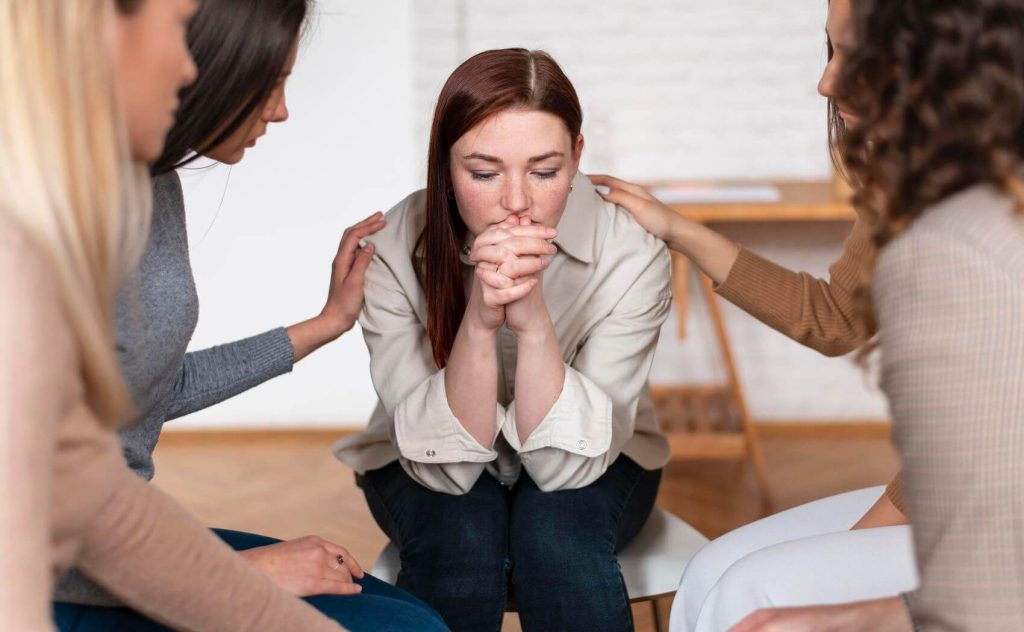Depression is a serious disorder that, unfortunately, is very common among students. Research shows that in 2022, the number of American students diagnosed with depression reached 33%. Another sad fact is that, while the condition is treatable, not all affected people seek professional psychological support.
If you have a depressed friend or a loved one, you may want to help them get better and convince them to go to therapy. Well, we are here to tell you that your support is valuable and may be instrumental in their recovery!
This article by Psychology Writing team will tell you how to help a friend with depression. It contains essential information, handy tips, and plenty of resources for you to check out.
🔍 Understanding Your Friend’s Depression
If you’ve never had to deal with depression, you may have a hard time understanding what exactly your friend is going through. Let’s start with the basics.
Depression is a severe psychological disorder that negatively affects your mood and disrupts your ability to function. Depression leads to a loss of interest in activities you usually enjoy. Affected people may feel persistent sadness and anxiety, a dramatic decrease in motivation and inspiration, and an unwillingness to live to the fullest.
Unfortunately, there are a lot of misconceptions about depression that contribute to the stigma surrounding it. Here are the key facts you should know:
- Depression is a mental disorder. Don’t underestimate its adverse effect on mental well-being.
- If a depressed person suddenly starts lashing out at you, and it scares you, remember that the core of the issue is not in your behavior or theirs. The problem lies in your friend’s mental state.
- Depression significantly reduces motivation. So, if you want to help your friend, give them time to gather strength and make the first step towards recovery.
- Remember that you can’t provide professional psychological support, but you can set your friend in the right direction toward rehabilitation and support them throughout their journey.
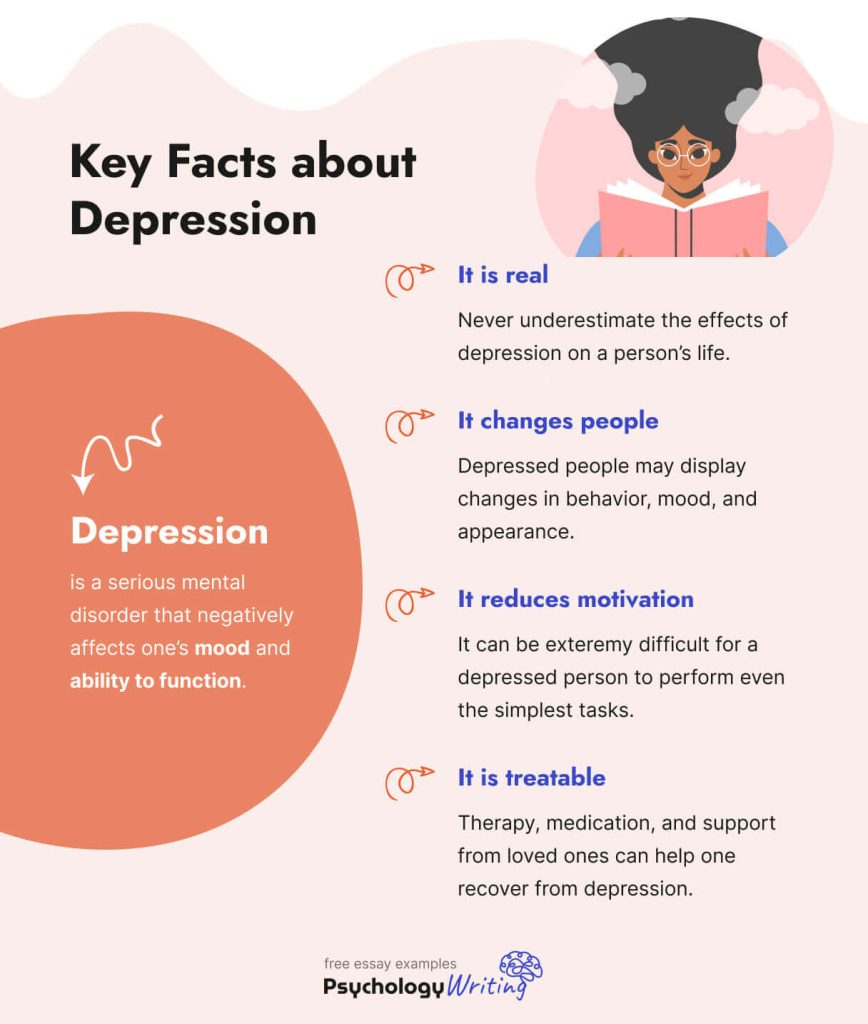
Depression Types
When you deal with depression, it’s essential to know what type it is. Each one has different causes and symptoms:
- Clinical depression is a severe mental disorder with intense symptoms lasting for two or more weeks. Clinical depression interferes with everyday life and causes severe problems to psychological and physical health.
- Bipolar depression is associated with dramatic mood swings. People with bipolar disorder constantly move from low to high phases. During the low periods, they are unmotivated to function normally, while the high periods lead to an over-energetic lifestyle.
- Dysthymia is a slighter form of depression compared to other types. However, this is a long-lasting condition with a duration of two years or longer.
- Postpartum depression is a condition that some people face after giving birth. It is often confused with “baby blues.” But there is an important distinction:
- “Baby blues” is a short-term condition that causes minor sadness and mood swings.
- In contrast, postpartum depression is a more serious long-lasting disorder that leads to insomnia, restlessness, excessive crying, anger, and other severe symptoms.
- Seasonal depression (or seasonal affective disorder) is caused by a lack of sunlight. It usually lasts from the late fall or winter to spring or summer. People with seasonal depression may experience problems with sleep, concentration, and loss of appetite and energy.
Recognizing the Symptoms
Have you noticed changes in your friend’s mood, appearance, or behavior? Keep an eye on them to understand if they are experiencing the symptoms of depression.
The most common signs of depression are:
Besides changes in behavior, mood, and appearance, you may notice some verbal signs indicating depression:
- Pay attention to what your friend is saying to you and others. If you hear phrases like “I’m worthless,” “I wish I didn’t wake up today,” or “my life is a mess,” that’s a red flag.
- Also, keep track of what your friend is posting on social media. If you notice dark poetry, disturbing videos, songs, or suspicious hashtags (i.e., #igiveup, #imworthless, #imdone), your friend may be experiencing mental struggles.
Causes of Depression in Students
Student life can be tough. When students are overwhelmed with stress, they can become emotionally vulnerable. As a result, they may experience psychological struggles.
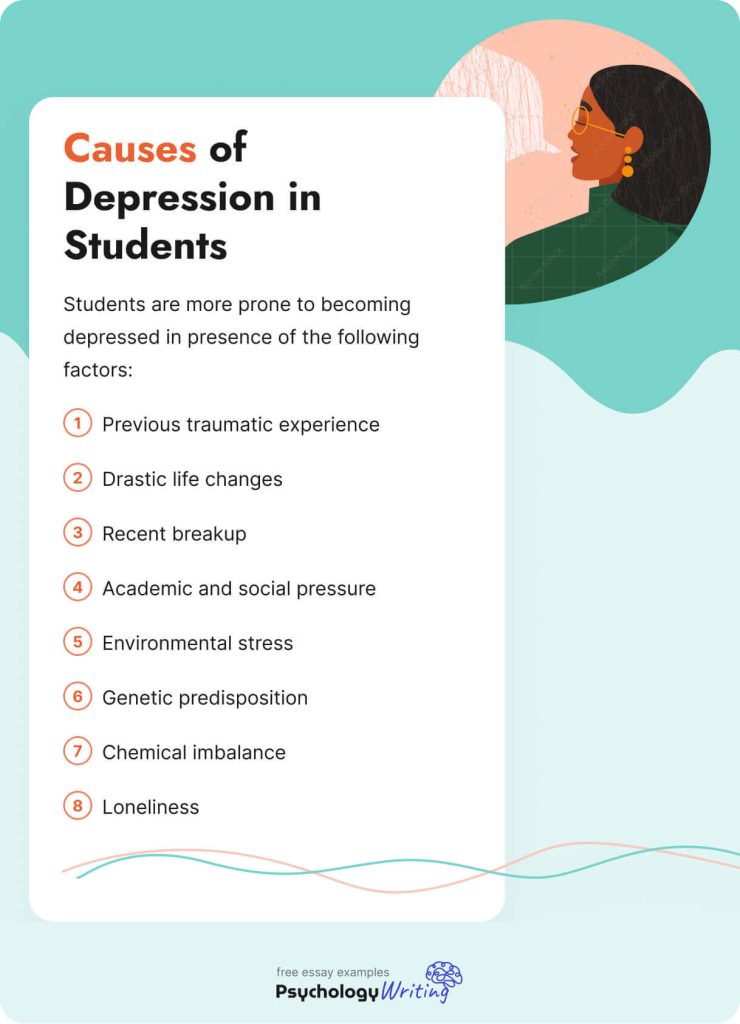
Here are the most common causes of depression in students:
️🌧️ Why Depression Can Scare Friends Away
Depressed people may notice that their friends are withdrawing from them. Here are some of the reasons why this happens:
- People don’t want to be surrounded by someone struggling with depression because they are afraid they, too, might become depressed.
- People find it difficult to empathize. They don’t know how to support someone with depression, so they prefer to keep their distance instead.
- People’s attempts to support a depressed friend feel useless. It seems that nothing helps, so they give up and drift apart from their friend.
- Depressed people often push their loved ones away. This can be very frustrating, especially if you don’t know the reason for such coldness.
🤝 Why Support is Important for Recovery
Even though people with depression can alienate those around them, it is essential to support them until they fully recover. Don’t believe us? Well, we’ve got research to prove it:
The recent study published by Electron Physician journal shows that stress levels for people who receive support from their friends and loved ones are lower than for those who don’t: those with support had stress levels of 5 out of 10 compared to people without assistance who had average stress levels of 6.3 out of 10. Help from friends, family, or support groups does wonders for mental health!
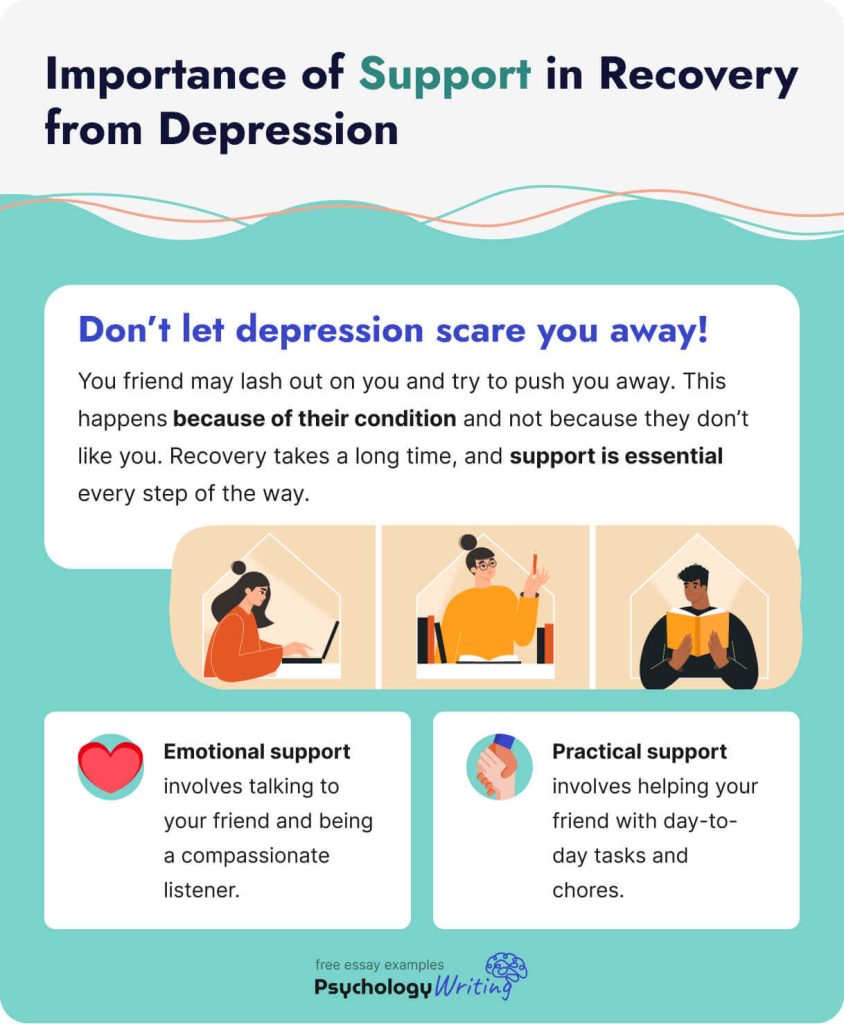
There are two main types of social support that you can provide to your depressed friend:
🗨️ Talking about Depression
Talking about depression is hard. Some people do not know what to tell someone who is depressed. Others are afraid to say too much and only make things worse.
Depressed people themselves may also keep quiet in an attempt to hide what is going on. Talking or just listening is extremely important for people with this condition, and we hope our tips will help you with this crucial step.
Starting the Conversation
Initiating a conversation about depression is the hardest step. A good strategy is to use statements with “I” instead of “you.” Here are some effective conversation starters you may use:
- “I’ve noticed some changes in your behavior recently.”
- “I’m concerned about your mental state.”
- “I just wanted to check if you are feeling okay.”
Once you’ve started the conversation, you can ask the following questions:
- “When did you notice the changes in your mood?”
- “What can I do to help you?”
- “Would you mind sharing your feelings with me?”
- “Have you considered getting professional help?”
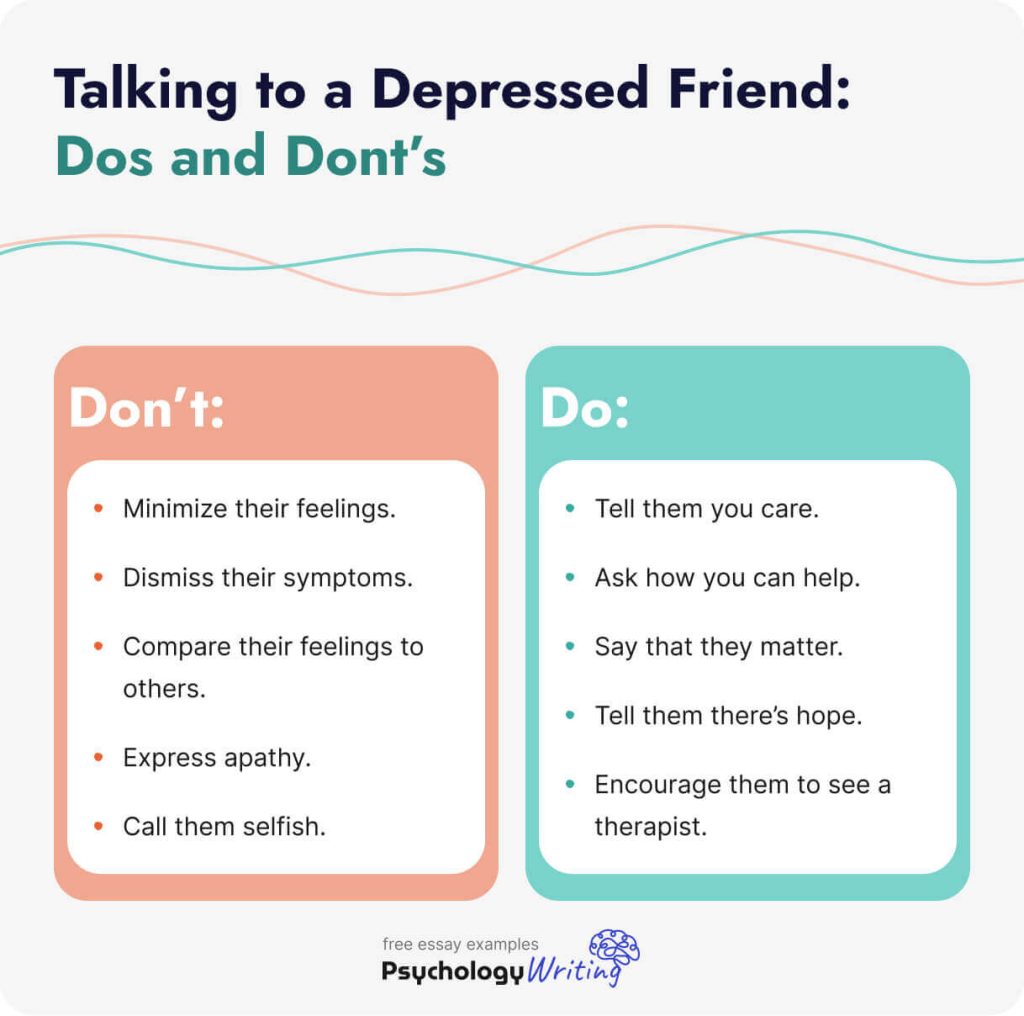
What to Say
Once you have the conversation going, it’s essential to keep selecting appropriate words. Remember that depression makes one very sensitive, and you don’t want to hurt your friend’s feelings. Here are some nice things you can say to them:
- Tell them you’re there for them.
Depression often leads to feelings of loneliness and isolation. Prove your friend wrong! Tell them that you are always near and ready to support them.
✅ Phrase to use: “You are not alone; I’ll help you get through this tough period.” - Say that you care
When it feels like the entire world has turned away from you, hearing someone say “I care” can help change things for the better. You don’t need to be eloquent: share simple, sincere words of support with your friend. A gentle hug would also strengthen the effect.
✅ Phrase to use: “I care about you and your feelings.” - Tell them that they matter.
Don’t let your friend feel worthless. Let them know that you are happy to have them in your life. You can also emphasize your friend’s value to their family.
✅ Phrase to use: “You are important to me. Your parents can’t imagine their life without you.” - Remind them that it’s okay to feel this way.
Depressed people often experience guilt for the way they feel. They worry about being a burden to their family and loved ones. But in reality, it’s not their fault that depression has affected them. Be empathic and assure them that they have no reason to feel guilty.
✅ Phrase to use: “You are not a burden to anyone; depression is not your fault! I am here to support you.” - Tell them there is hope.
Prove to your friend that depression, like most other illnesses, is treatable. With proper therapy and support from you, they will recover!
✅ Phrase to use: “You will get better, believe me. I will do my best to support you along the way.” - Ask them whether they want to talk.
Sometimes, a sincere conversation is the best medicine for a depressed friend. Allow them to express their feelings to you. Listen to your friend carefully without interruptions.
✅ Phrase to use: “Wanna talk? I am ready to listen.” - Ask how you can help.
Ask if you can do anything specific for your friend. They may be reluctant to ask you outright, so it would be better if you bring it up yourself.
✅ Phrase to use: “Is there anything specific I can do for you? I could help you with everyday tasks or anything else you might need.”
What Not to Say
Words can heal, but they can also hurt. To ensure that you don’t offend your friend, check out this list of things that are definitely not worth mentioning.
🔝 Helping Someone with Depression: 9 Best Tips
Supporting a person battling with depression is a real challenge. We know how hard it is to provide the best possible help without sacrificing your own mental well-being. But there is a way! Here are the most actionable tips for assisting your friend on their way to recovery:
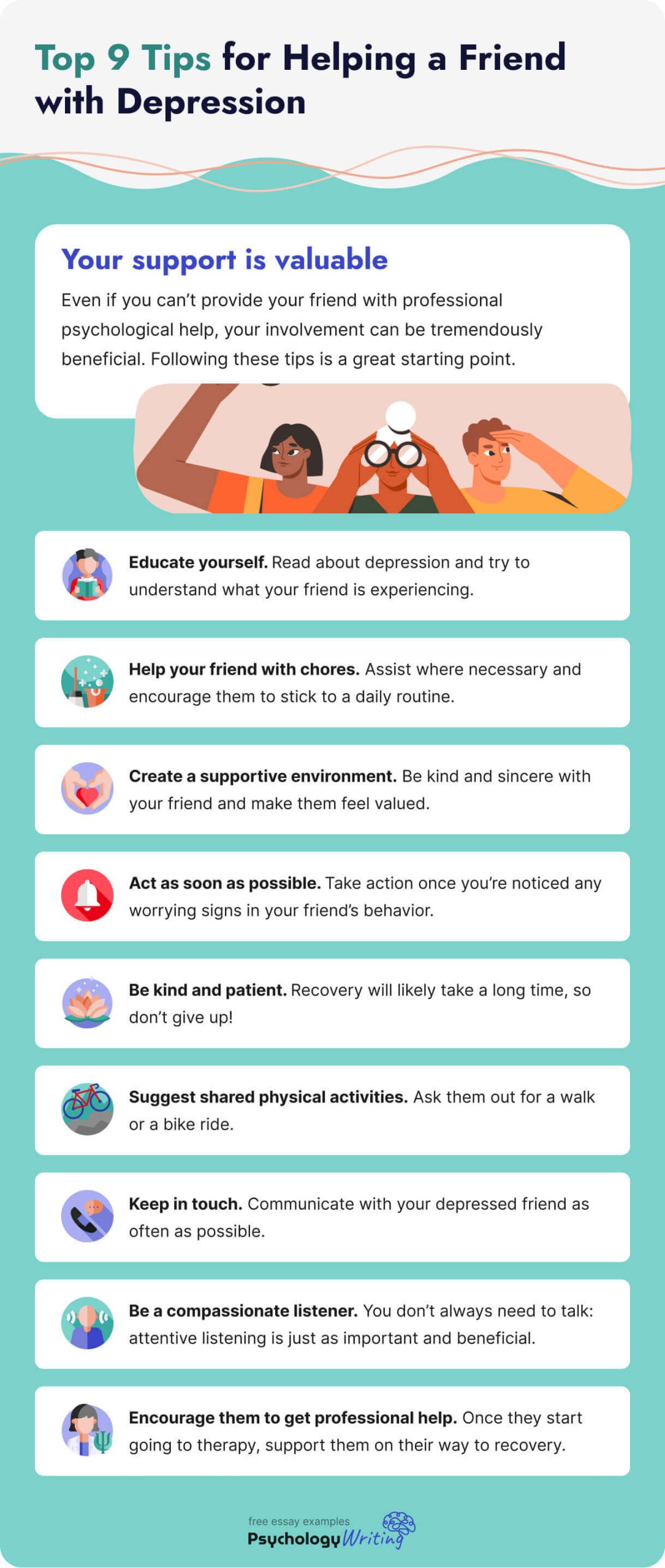
Wondering how to motivate someone with depression to go to therapy? We’ve got the answer below!
❤️ Encouraging Your Friend to Get Help
Deciding to get professional support is the most significant step on the road to recovery. People with depression often refuse to go to a psychologist or a therapist. If your friend is refusing care, you need to gently encourage them to give it a try:
- Prove that therapy is effective in treating depression.
- Show them there’s nothing shameful about it.
- Convince them that they have a real problem that needs treatment.
Once they agree, you can help them find a specialist, accompany them to appointments, and help track their progress. Whenever they get one step closer to recovery, celebrate it together in a friendly atmosphere.
🖥️ Where to Get Help: Top 10 Options
Is someone close to you struggling with depression? If so, make sure to check out this list of resources. It will help you find the right professional and learn more about the condition and its treatment:
- Project Air
Project Air is an extensive database that contains factsheets, videos, guidelines, and scientific work on mental health. Visit their website to find lots of crucial information and valuable insights on the treatment of depression. - National Alliance on Mental Illness
NAMI is a psychological service that provides professional support 24/7 through various channels: online chat, email, and helpline. You can also find here answers to mental health-related questions and practical tips. The resources on this website contain information to address various psychological needs and concerns. - Anxiety & Depression Association of America
This website connects you to a professional who will help you overcome depression, PTSD, anxiety, OCD, and related disorders. You will find psychologists, psychiatrists, clinical social workers, and other mental health professionals here. - Psychiatry.org
This unique resource helps you find a psychiatrist in your area. All you need to do is provide details on your location, and the system will find suitable specialists. The psychiatrists on this platform specialize in treating mental illness and substance abuse disorders. They all gained their qualification at medical institutions and have at least three years of psychiatry experience. - APA’s Psychologist Locator
APA’s Psychologist locator is a search tool that connects you with a mental health professional in your city or state. The platform helps you find an expert in virtually any practice area, including depression. You can refine the search by specifying preferred treatment methods, the provider’s gender identity, and various specializations. - Psychology Today
This resource has the latest news and countless articles on psychology meant for a wide audience of readers. It also helps you find a psychiatrist or psychologist. - Faithful Counseling
This online platform is the perfect option if your friend is religious. It offers mental health therapy from a Biblical perspective. Options include video sessions, phone calls, and seminars on various topics. - Association for Behavioral and Cognitive Therapies
This organization is all about cognitive behavioral therapy, which focuses on reshaping the thoughts and behaviors of patients. This therapy is highly effective for treating depression and other mental disorders. You can search through the directory of local clinicians and find a CBT therapist for you. - 988 Lifeline
This is an emergency service that provides instant psychological help. If you notice that someone is attempting to hurt themselves, reach out to 988 Lifeline immediately!
Warning signs can include:
- Finding a way to kill oneself.
- Talking about the desire to die.
- Extreme mood swings.
- Talking about being a burden to others.
- Demonstrating an unwillingness to live.
If you’ve noticed any of these symptoms, call 988!
- SAMHSA’s National Helpline
SAMHSA’s National Helpline is a free service that works round the clock, 365 days a year. It offers urgent psychological support to individuals suffering from mental disorders and substance abuse.
These resources will help you guide your depressed friend through the recovery process. But in the initial stage, we recommend visiting the primary care doctor to get some suggestions on further therapy.
🎁 Bonus: What to Do for Yourself
Caring for your friends is important, but don’t forget about yourself! After all, being too involved in your friend’s emotional struggles may result in the deterioration of your own mental state. Here are some simple suggestions that will help you maintain your psychological well-being:
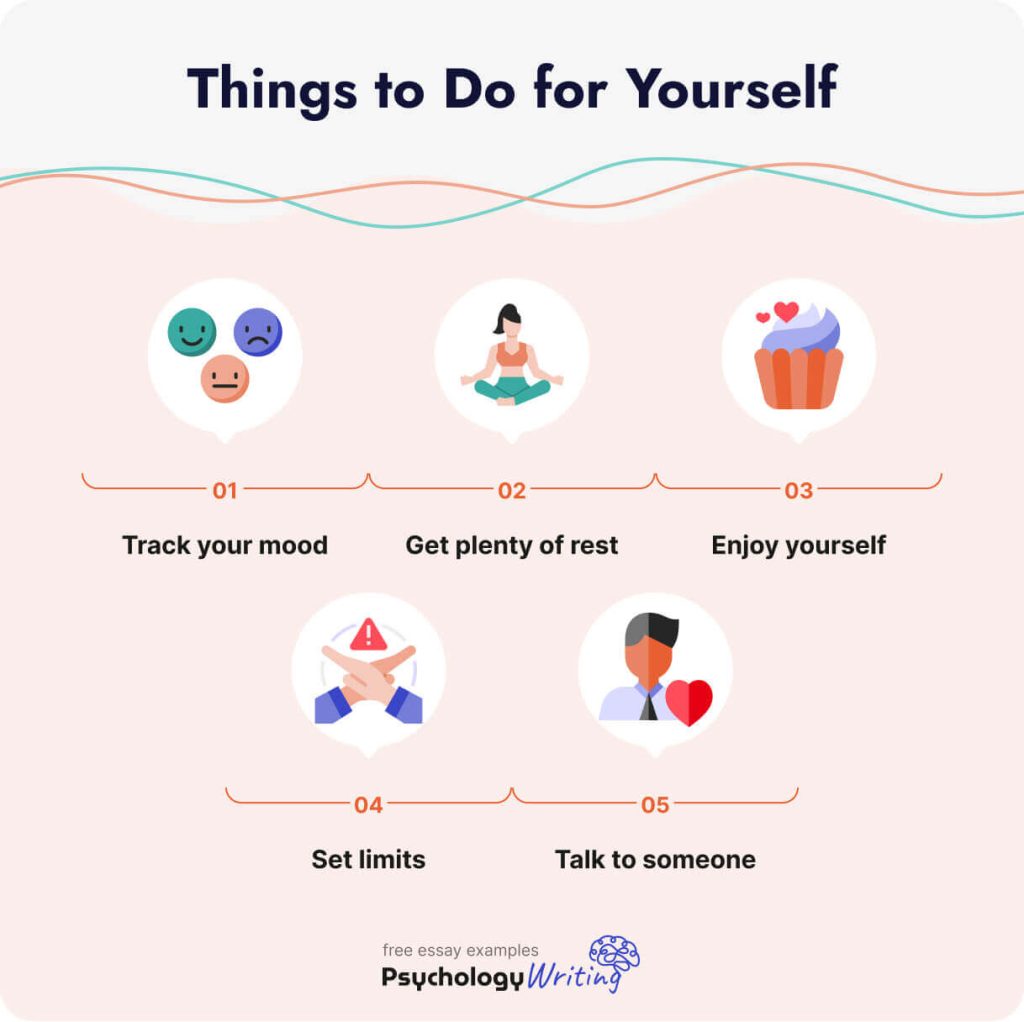
And now you’re all set to start helping your friend on their way to recovery.
Thank you for visiting our website! We hope our tips will be helpful for you. Take good care of yourself and your loved ones!
🔗 References
- Depression: Types, Causes, Symptoms, & Treatment: Cleveland Clinic
- Depression: World Health Organization
- Signs Your Friend Might Be Struggling Emotionally: The Jed Foundation
- Why Depression Hits Different in College: Best Colleges
- The Importance of Having a Support System: Mental Health First Aid
- 7 Ways to Support a Depressed Friend: Forbes
- Social Support and Protection from Depression: Systematic Review of Current Findings in Western Countries: Cambridge University Press
- What Causes Depression: Harvard Health
- The Treatment of Depression—Searching for New Ideas: FrontiersIn
- Depression: Why to Talk?: National Institute of Health
- The Role of Sources of Social Support on Depression and Quality of Life for University Students: Taylor & Francis Online

